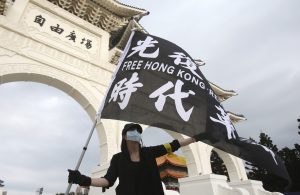Taiwan on Wednesday opened an office to help people fleeing Hong Kong, its strongest response yet to calls to provide humanitarian assistance to Hong Kongers leaving the city due to ongoing pro-democracy protests and a newly imposed national security law.
The Taiwan-Hong Kong Services and Exchange Office will serve as a hub for a task force established last month to provide direct assistance to Hong Kongers who wish to stay in Taiwan.
“China’s disregard for the will of Hong Kong’s people proves that ‘one country, two systems’ is not viable,” President Tsai Ing-wen said Tuesday on Twitter. “Taiwan’s commitment to supporting those HKers who want freedom and democracy has never changed.”
Tsai has gained broad popularity in large part due to her steadfast support of Hong Kong’s pro-democracy protests. But her administration had faced criticism in the past for not doing more to directly assist Hong Kongers resettling in Taiwan.
In Wednesday’s announcement, Mainland Affairs Council Minister Chen Ming-tong said the newly imposed Hong Kong national security law created an “opportunity” for Taiwan to woo talent from Hong Kong, and that the country would “welcome multinational companies to move their headquarters here.”
The office is “an important milestone for the government to further support democracy and freedom in Hong Kong,” Chen said.
While Taiwan’s borders remain closed to tourists due to the COVID-19 pandemic, authorities recently began allowing foreign nationals to apply for entry for reasons other than tourism, explicitly saying that people in Hong Kong and Macau could apply to enter based on humanitarian considerations or a need for emergency assistance.
Taiwan does not have a formal refugee law. The office will utilize Article 18 of the Laws and Regulations Regarding Hong Kong and Macao Affairs, which allows Taiwan to provide “necessary assistance” to people in Hong Kong and Macau whose safety and liberty are threatened due to political factors.
The office will receive applications via two dedicated hotlines, which will then be reviewed by the Mainland Affairs Council and other government agencies.
Taiwan had not previously cited Article 18 publicly when granting Hong Kongers the right to extend their stays in the country, although it has quietly created avenues for asylum seekers from the city to remain in Taiwan.
Many Hong Kongers obtained student visas at one of Taipei’s universities after several schools removed visa quotas for Hong Kong nationals late last year. Others who cannot obtain work or study visas have had their tourist or landing visas extended on a case-by-case basis.
Lam Wing-kee, the Causeway Bay bookseller who fled to Taiwan last year fearing he would be extradited to China, reopened his bookstore in Taipei in April. However, most Hong Kongers in Taiwan have not identified themselves publicly, fearing retribution at home should they not be allowed to stay permanently.
Chen, the Mainland Affairs Council minister, did not say Wednesday how many applications the office had received, although his deputy minister said the office would have about 20 staff to handle 20 hotlines, which remained busy on the office’s first day of operation.
Refugee and human rights advocates, along with politicians across the political spectrum, have in the past called for Taiwan to formalize assistance measures for people fleeing Hong Kong after the city’s pro-democracy protests intensified last summer.
It remains uncertain whether the new office will lead to a wholesale shift in the process of directly assisting Hong Kongers, but the newly imposed national security law has provided an impetus for Taiwan to publicly take action.
The United Kingdom said Wednesday it would offer a path to citizenship to over 3 million Hong Kong nationals who hold British National Overseas (BNO) passports or are eligible to apply for them.
The United States Congress launched a bipartisan bill on Wednesday to grant refugee status to Hong Kong residents at risk of persecution due to the new national security law.
United States Democratic presidential candidate Joe Biden recently said he would “work with our allies and partners to stand against China’s assault on Hong Kong’s freedoms” and would “support a pathway for those persecuted to find safe haven in the United States and other nations.”
Chen on Wednesday expressed concern over the new national security law, noting that Article 38 of the law allows nonresidents of Hong Kong, including Taiwanese nationals who support the pro-democracy protests, to be prosecuted for crimes defined in the act while outside of Hong Kong.

































